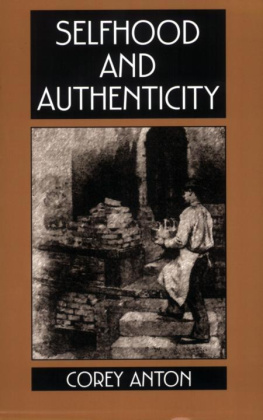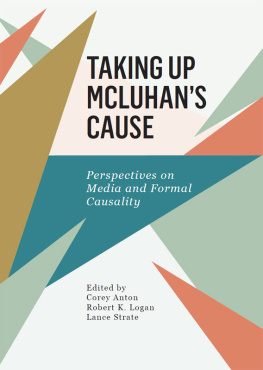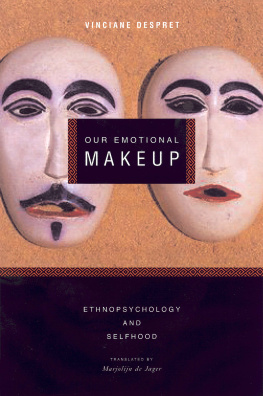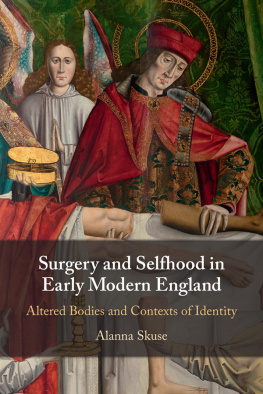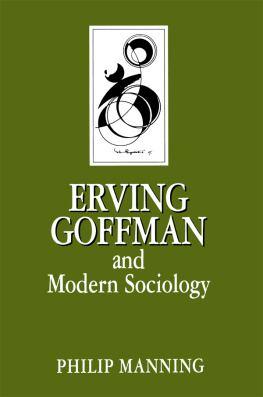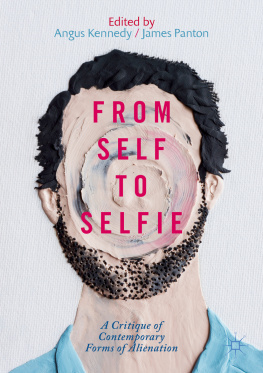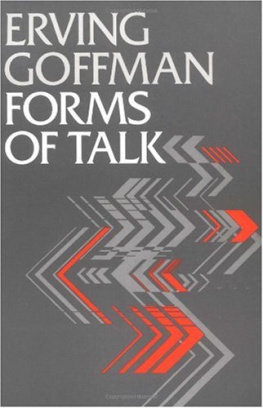Corey Anton - Selfhood and Authenticity
Here you can read online Corey Anton - Selfhood and Authenticity full text of the book (entire story) in english for free. Download pdf and epub, get meaning, cover and reviews about this ebook. year: 2012, genre: Religion. Description of the work, (preface) as well as reviews are available. Best literature library LitArk.com created for fans of good reading and offers a wide selection of genres:
Romance novel
Science fiction
Adventure
Detective
Science
History
Home and family
Prose
Art
Politics
Computer
Non-fiction
Religion
Business
Children
Humor
Choose a favorite category and find really read worthwhile books. Enjoy immersion in the world of imagination, feel the emotions of the characters or learn something new for yourself, make an fascinating discovery.
- Book:Selfhood and Authenticity
- Author:
- Genre:
- Year:2012
- Rating:4 / 5
- Favourites:Add to favourites
- Your mark:
- 80
- 1
- 2
- 3
- 4
- 5
Selfhood and Authenticity: summary, description and annotation
We offer to read an annotation, description, summary or preface (depends on what the author of the book "Selfhood and Authenticity" wrote himself). If you haven't found the necessary information about the book — write in the comments, we will try to find it.
Selfhood and Authenticity — read online for free the complete book (whole text) full work
Below is the text of the book, divided by pages. System saving the place of the last page read, allows you to conveniently read the book "Selfhood and Authenticity" online for free, without having to search again every time where you left off. Put a bookmark, and you can go to the page where you finished reading at any time.
Font size:
Interval:
Bookmark:

COREY ANTON
ix
Chapter 1 3
Chapter 2 15
Chapter 3 53
Chapter 4 83
Chapter 5 115
Chapter 6 147
This work is indebted to many persons. Most broadly, I want to thank my colleagues at Purdue and Grand Valley. I also thank the Purdue Research Foundation for a summer grant which greatly facilitated the early drafts of this work.
I must thank William K. Rawlins for all of his passion and open encouragement regarding my project. Without his continuing support, and especially his early guidance into Taylor's work, the project that generated this book would not have happened. I need to thank Calvin 0. Schrag for his interest and many trenchant directives to the content of the manuscript. I particularly wish to express thanks for his quick perusals, immediate feedback, and many useful suggestions. I want to thank Mary Keehner for her many useful criticisms and suggestions for future research into rhetorical applications. And, finally, I also wish to express thanks to Jacqueline Martinez for her insightful concerns and suggestions regarding the political and scholarly implications of the project.
I want to express a deep thanks to a circle of intimate friends: Brenda, Scott and Tara, Tom and Amy, Steve and Betsy, Bryan and Joy, Laural and Jeff, and Laurie and Jonathan. I additionally want to acknowledge Abe, Mathias, Henry, Barry, Phil, and Bryan for many stimulating discussions, and also, I want to thank Stephanie for helping me through the final chapters. It was all of these people who have encouragingly endured and deeply enriched my seemingly endless-and sometimes exasperating-talk. Innumerable hours of our rangy conversations facilitated, shaped, and settled the present manuscript; more than I ever have explicitly stated and certainly more than I could express adequately. I also need to express a special thanks to Thomas S. Wright, Robert Mayberry, and Jermaine Martinez for their assistance in proofreading and editing the work during its final stages.
I must thank my family, especially my parents, for all they have done to enable this project. Without their loving support and understanding, I would not have made it this far. Also, I need to acknowledge that, in many ways, my concern regarding authenticity and the changing character of selfhood was inspired by and grounded in my parents' many lessons about meaning and existence.
Finally, I cannot not give a sounding acknowledgment to someone without whom I most likely would not have studied communication, to say nothing of entertaining the idea of graduate studies. Perhaps, only those who have been fortunate enough to have learned from him personally will know how much of the present work is indebted to Lee Thayer. In many ways, it was Thayer who convinced me to believe, to know passionately, that "as we communicate, so shall we be."
Charles Taylor's little work, The Ethics of Authenticity (1991), describes the distinguishing marks of modernity by addressing a moral ideal which informs numerous practices and beliefs in contemporary American and Western cultures. This ideal, that of authenticity, most broadly refers to the modern "quest" for self-fulfillment, self-realization, or personal development. For example, somewhere, individuals pursue with zeal and passion what they want to be when they grow up. Elsewhere, persons feel vaguely dissatisfied with their inability to get it all together or their indecision regarding what they want to do with their lives. Many people currently are entering the bond of marriage, seeking dreams of personal fulfillment and long-lasting happiness, i.e., a "happily-ever-after." Others are leaving a long-term marriage which, for at least one partner, was no longer self-fulfilling, no longer worth it. Such doings-and many more could be offered-seem to make sense to most of us. Indeed, many people in our culture feel themselves called to be true to themselves, called to pursue personal quests for development and fulfillment. In a word, many people today feel that it is their right to live personally meaningful lives.
SOME BACKGROUND ON AUTHENTICITY
This is not to say that individuals at other times and places did not also seek something like self-fulfillment (Campbell, 1949). Rather, as Taylor (1991) suggests, "the point is that today many people feel called to do this, feel they ought to do this, feel their lives would be somehow wasted or unfulfilled if they didn't do it" (p. 17). Further describing the centrality of this odyssey in modern cultures (e.g., the United States), Taylor argues:
It is hard to find anyone we would consider being in the mainstream of our Western societies who, faced with their own life choices, about career or relationships, gives no weight at all to something they would identify as fulfillment, or self-development, or realizing their potential, or for which they would find some other term from the range that has served to articulate this ideal. (1991, p. 75)
The overarching point is that modernity has ushered in something like what Taylor calls a "culture of authenticity." We can find this ideal throughout the culture and can register its weight on many scales. But even if we grant that drives for personal fulfillment characterize the mainstream of modern cultures, whether this is a bane or boon remains open to debate.
In fact, to the debate about the culture of authenticity we most likely find ourselves as latecomers. Both "boosters" and "knockers," as Taylor terms them, have emerged already. The boosters, commonly siding with the intellectual left, celebrate the modern individual's sense of freedom and right to "do their own thing." An individual's prerogative to decide for him- or herself basic life issues is advocated and furthered. Said otherwise, the boosters, often continuing a neo-Nietzschean spirit, want to advance individual's "poetic license" for composing and accomplishing their own lives and the sense of meaning for them. Indeed, boosters valorize the spirit of artists and poets, and suggest that one's life is an accomplishment won away from the leveling indifference of mass society. Thinkers from this camp even claim that more individualization is necessary, that even further deconstruction of mass morals or meanings is warranted.
The knockers, on the other hand, generally believe that the culture of authenticity reflects a moral laxity, and hence, in actuality, is no ethical ideal at all. Rather, it is an unfortunate relativizing of ethics, a license for moral sloth. That is, because the background premise to the ideal of authenticity is that one must realize a potentiality which is properly one's own, some thinkers suggest that this kind of thinking leads people into degraded, absurd, or trivialized modes of existence, if not socially irresponsible ones. The individualization of human life, and an increasing ego-centeredness, can "flatten and narrow" life's moral and ethical significance. Hence, although some aspects of the world and its order are open to the individual's poetic appropriations, they are not completely self-determined, and so individuals, according to the knockers, may have mistaken an epistemological insight of relativity for a practical or ethical maxim.
Font size:
Interval:
Bookmark:
Similar books «Selfhood and Authenticity»
Look at similar books to Selfhood and Authenticity. We have selected literature similar in name and meaning in the hope of providing readers with more options to find new, interesting, not yet read works.
Discussion, reviews of the book Selfhood and Authenticity and just readers' own opinions. Leave your comments, write what you think about the work, its meaning or the main characters. Specify what exactly you liked and what you didn't like, and why you think so.

